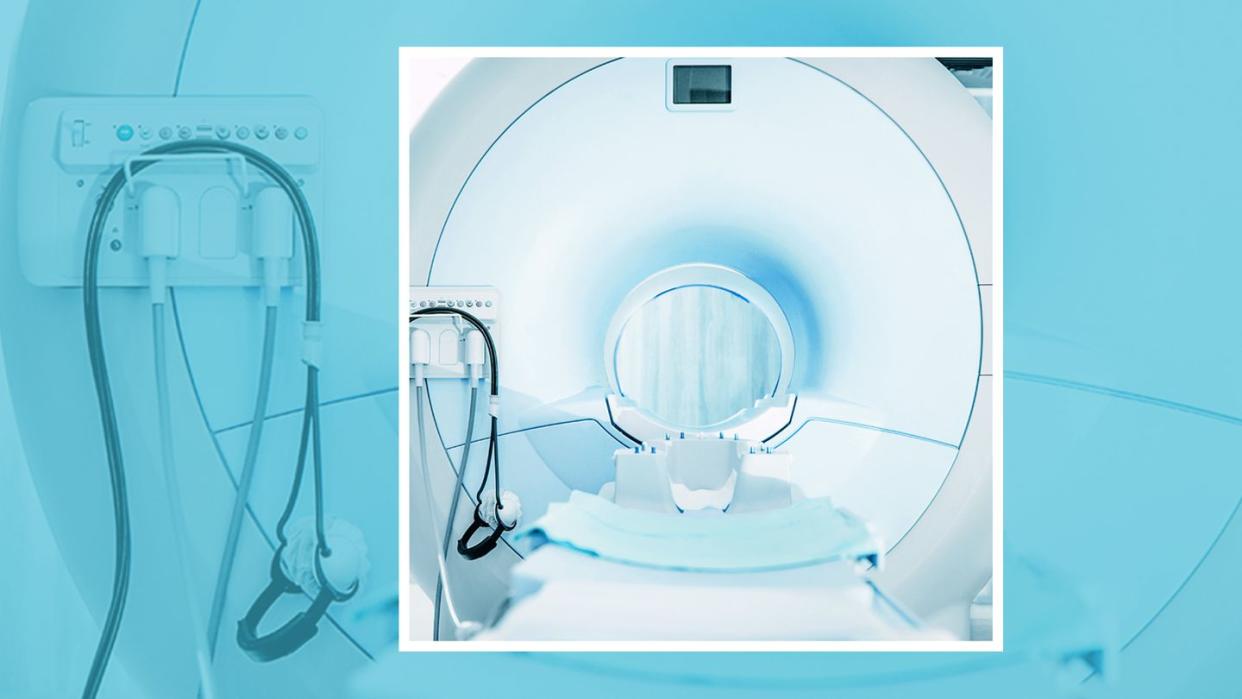Celebs And Influencers Are Getting $2,500 Health Scans—Should You?

If you’ve ever gotten an MRI, it was probably ordered by your doc based on symptoms or a potential injury that warranted a deeper look, right?
Now imagine going in for one for, well, no specific reason, exactly—instead, for overall well-being. An increasing number of start-ups now offer preventive health MRIs (which use powerful magnets and radio waves to create images of your body). They claim to help diagnose medical conditions early—improving both lifespan and general health.
Prenuvo, for example, is a company that provides full-body scans (at eight locations around the U.S. and Canada, with more coming soon) to potentially detect over 500 conditions including early-stage tumors and issues like muscle tears, fat deposition in the liver, and appendicitis.
ICYMI: This is the test that helped Maria Menounos detect a stage two pancreatic neuroendocrine tumor this past January. Ezra is another company that offers a similar scan in six cities.
In addition to a high price point (scans can cost upwards of $1,000), there are a ton of details to consider before booking your appointment.
Here's what to know about this next-gen workup's compelling—or potentially deterring—aspects.
Meet the experts: Jeffrey Morrison, MD, is an integrative medicine physician at the Morrison Center in New York City. Keri Peterson, MD, is an internal medicine physician in New York City, and a WH advisory board member.
Is it worth doing a full-body MRI?
If you're wondering if this type of scan is really a proactive step to take care of your health, the answer depends on who you ask.
Jeffrey Morrison, MD, an integrative medicine physician at the Morrison Center in New York City, has been waiting for this type of walk-in test offering like this and recently had one himself.
“A full-body scan can give you a huge level of confidence in your health,” he says, allowing you to be proactive about treatment whether it uncovers something serious or minor. (Dr. Morrison learned he had arthritis of the back and was then able to work with his massage therapist and integrate more mobility exercises to address it.)
However, it’s important to note that the American College of Radiology (ACR) does not believe “there is sufficient evidence to justify recommending total body screening for patients with no clinical symptoms, risk factors, or a family history suggesting underlying disease or serious injury.”
So, ask yourself (and a trusted doc) if more data makes you feel in control or causes you to spiral, and whether a scan is in your budget, since insurance generally does not cover them.
What does a full-body MRI include?
In some cases, the scan can replace some other medical tests. But experts still recommend tests like a mammogram and colonoscopy because an MRI may not see microcalcifications in the breast or small polyps in the colon.
For other health issues that MRIs help screen for (think: a cancer-related mass elsewhere in the body, head pain/injury, etc), there’s no difference in the actual imaging from a full-body one compared to a targeted one—you essentially cover more ground in one swoop. So, if you wanted to investigate your migraines and also screen for melanoma, for instance, a full-body MRI is a one-stop shop.
Another note: Tests like this aren’t a replacement for other preventive health behaviors, like eating a healthy diet, exercising, and getting your yearly physical, adds WH advisor Keri Peterson, MD, an internal medicine physician in New York City.
How much does a full-scan MRI cost?
The exact cost can vary depending on the company and provider, but a full-body MRI scan from Prenuvo runs you $2,499 per hour-long session, their website says. A 20-minute torso scan costs $999, and a 45-minute torso and head scan comes in at $1,799.
At Ezra, a full-body scan costs $1,950, while a "full body plus" scan (which includes a five-minute low-dose chest CT) is $2,350.
Does the scan catch everything?
Unfortunately, the scans are not exactly foolproof. “One of the notable concerns is that screening your whole body could leave you with a false positive,” says Dr. Peterson, although these companies try to avoid it through advanced tech.
But if the scan picks up, say, a mass that then requires a biopsy and turns out to be benign, you end up with findings that result in unnecessary follow-up testing, procedures, and expenses.
That’s why Dr. Peterson only considers a full-body scan valuable for patients with a strong family history of cancer. If you’re worried about pieces of your health history and interested in this test, chat with your primary physician as a first step. While Prenuvo, for example, does offer a nurse practitioner to walk you through results, it doesn’t hurt to involve another pro who knows your health intimately.
Is it safe?
Pretty much. The process itself is risk-free. Unlike CT scans and X-rays, MRIs do not use radiation, says Dr. Morrison.
However, you will be subjected to the inside of an MRI machine for close to an hour. You typically can watch Netflix or listen to music, but the experience is noisy and “somewhat arduous,” he notes.
You Might Also Like

